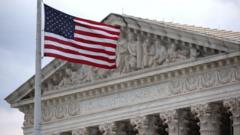The US Supreme Court has ruled that Oklahoma cannot use state funding to support what would have been the nation’s first religious charter school, following a split decision that ended in a 4-4 deadlock. This outcome reinforces a prior ruling by the Oklahoma State Supreme Court, which determined that the establishment of such a school contravenes the First Amendment of the US Constitution.
The charter school, proposed by the Catholic Archdiocese of Oklahoma City and the Diocese of Tulsa, was expected to receive approximately $23.3 million in public funding over a five-year period. Charter schools are publicly funded yet operate independently, a status that makes the question of funding religious institutions particularly contentious. The Supreme Court's tie does not set a nationwide precedent, indicating that future cases concerning similar issues may still be considered.
While the Court did not disclose individual justices' voting patterns, it appeared to be divided along ideological lines during hearings in April. Notably, Justice Amy Coney Barrett recused herself from the case, leaving the court without an odd-numbered panel for a decisive ruling.
The ruling is viewed as a landmark test of the constitutional boundaries regarding religion, particularly since the First Amendment expressly prohibits government actions that establish a religion. The case encapsulated two contrasting perspectives on religious freedom: the Oklahoma Attorney General Gentner Drummond, a Republican, argued that allowing public funding for religious institutions undermines the principle that taxpayer money should not support religious education, while proponents of the charter school claimed that denying funding was discriminatory.
Drummond celebrated the decision as a significant victory for religious freedom, ensuring taxpayers are not compelled to fund potentially radical religious schools. Conversely, officials from the proposed charter school expressed their disappointment, asserting their commitment to parental choice in education and announcing an intention to explore alternative options for delivering a virtual Catholic education throughout the state.
Initially green-lit by the Oklahoma State Virtual Charter School Board in 2023, the charter school sparked immediate controversy. While Governor Kevin Stitt showed support for its establishment, Drummond’s subsequent lawsuit culminated in this Supreme Court challenge. As charter schools continue to evolve within the educational landscape of the United States, they remain a focal point for those advocating for parents' rights in educational choice, juxtaposed against fears of advancing religious curriculum within public funding structures.
The charter school, proposed by the Catholic Archdiocese of Oklahoma City and the Diocese of Tulsa, was expected to receive approximately $23.3 million in public funding over a five-year period. Charter schools are publicly funded yet operate independently, a status that makes the question of funding religious institutions particularly contentious. The Supreme Court's tie does not set a nationwide precedent, indicating that future cases concerning similar issues may still be considered.
While the Court did not disclose individual justices' voting patterns, it appeared to be divided along ideological lines during hearings in April. Notably, Justice Amy Coney Barrett recused herself from the case, leaving the court without an odd-numbered panel for a decisive ruling.
The ruling is viewed as a landmark test of the constitutional boundaries regarding religion, particularly since the First Amendment expressly prohibits government actions that establish a religion. The case encapsulated two contrasting perspectives on religious freedom: the Oklahoma Attorney General Gentner Drummond, a Republican, argued that allowing public funding for religious institutions undermines the principle that taxpayer money should not support religious education, while proponents of the charter school claimed that denying funding was discriminatory.
Drummond celebrated the decision as a significant victory for religious freedom, ensuring taxpayers are not compelled to fund potentially radical religious schools. Conversely, officials from the proposed charter school expressed their disappointment, asserting their commitment to parental choice in education and announcing an intention to explore alternative options for delivering a virtual Catholic education throughout the state.
Initially green-lit by the Oklahoma State Virtual Charter School Board in 2023, the charter school sparked immediate controversy. While Governor Kevin Stitt showed support for its establishment, Drummond’s subsequent lawsuit culminated in this Supreme Court challenge. As charter schools continue to evolve within the educational landscape of the United States, they remain a focal point for those advocating for parents' rights in educational choice, juxtaposed against fears of advancing religious curriculum within public funding structures.



















